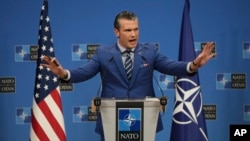U.S. Secretary of Defense Pete Hegseth has called for NATO’s European members to increase their role in the defense of Europe as the United States focuses on defending the alliance’s Pacific flank.
It is a move that he says will likely require European allies to significantly increase defense spending from 2% of GDP to about 5% of GDP.
"We can talk all we want about values. Values are important, but you can't shoot values, you can't shoot flags, and you can't shoot strong speeches. There is no replacement for hard power," Hegseth told reporters on Thursday at NATO headquarters in Brussels.
Last year, NATO’s European allies collectively spent 2% of their GDP, amounting to about $380 billion, for the first time after setting a 2% defense spending goal in 2014. The U.S. currently spends about 3.5% of its GDP on defense. Canada, the other non-European NATO ally, currently spends about 1.4% of its GDP on defense.
“NATO is a great alliance, the most successful defense alliance in history, but to endure for the future, our partners must do far more for Europe's defense,” Hegseth said. He emphasized that deterrence of Chinese aggression “in the Pacific is one that really can only be led by the United States.”
He said the U.S. does not seek conflict with China, nor does it feel that conflict with China is inevitable, but he contended the administration must work with allies to ensure deterrence in the Indo-Pacific is "hard power deterrence, not just reputational.”
Russia-Ukraine war
On Wednesday, Hegseth said keeping Ukraine’s pre-invasion boundaries is an “unrealistic objective” in its war against Russian aggression, as was the expectation that Ukraine would join NATO. He advocated for a negotiated end to the war with security guarantees backed by European and non-European troops that would not include U.S. forces.
German Defense Minister Boris Pistorius said Ukraine’s potential membership in NATO and whether it should concede any territory should not be decided before peace talks start, referring to Hegseth’s comments as “concessions” made by the United States.
"Vladimir Putin responds to strength,” Hegseth said on Thursday when asked whether the U.S. was decreasing Ukraine’s leverage.
“No one's going to get everything that they want, understanding who committed the aggression in the first place," he added, referring to Putin.
NATO Secretary General Mark Rutte reiterated his support for higher defense spending and appeared to defend Hegseth’s comments on Ukraine not joining the alliance. Rutte said on Thursday that while NATO must “make sure that Vladimir Putin never ever tries again to attack Ukraine,” he said, “it has never been a promise to Ukraine that as part of a peace deal, they would be part of NATO.”
The European Union’s top diplomat warned that any peace deal struck between the United States and Russia — without Ukraine or the EU — will fail.
“Trump says that the killing should stop. Putin can stop the killing by stopping bombing Ukraine. This is doable if there is a will,” said Kaja Kallas, the EU high representative for foreign affairs and security policy. She added that any agreement without Ukraine at the table amounts to appeasement.
Kallas’ comments reflected those of many NATO allies at Thursday’s meeting following U.S. President Donald Trump’s call with Putin and Trump's signaling that talks on Ukraine between the two were imminent.
After Thursday’s NATO ministerial gathering, Hegseth travels to Poland for what the Pentagon said will be talks with leaders about “bilateral defense cooperation, continued deterrence efforts along NATO's eastern flank and Poland's leadership as a model ally in defense investment and burden-sharing in NATO.”
Some information for this report was provided by The Associated Press, Agence France-Presse and Reuters.














